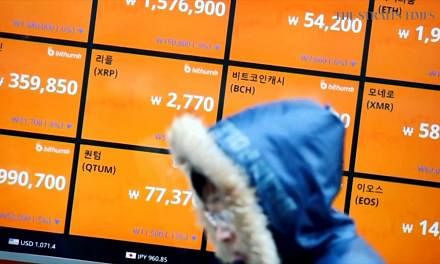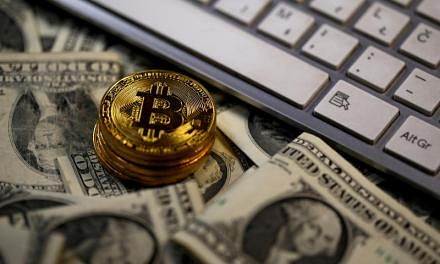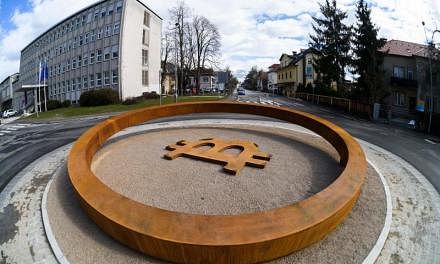Even after the bursting of the latest bitcoin bubble last week that saw the price correct about 40 per cent in four days, bitcoin remains the winning investment of the year; nothing else comes even close. On Jan 3, its price was just above US$800 . As of 10pm on Christmas Day, it was quoted on Coinbase - the largest bitcoin exchange - at US$14,072, an appreciation of about 1,660 per cent.
The 2017 bitcoin bubble was one of many that the world's first cryptocurrency has displayed, all of which have dwarfed the great bubbles of history like the Tulipomania of 17th century Holland, the South Sea bubble of the early 18th century and the dot.com bubble of the 1990s. And it was not even the biggest.
In 2011, bitcoin's price soared from about US$1 to US$30, and then collapsed to US$2 the same year. In 2013, the price went from less than US$15 in January to US$1,000 in November. At one point in early April that year, it went from US$260 on Wednesday morning to US$63 on Thursday afternoon.
There is little doubt that all of these episodes have been bubbles inflating and popping, in the sense that the price movements have been driven largely by orgies of speculative frenzy. If prices were driven by actual use, the quantity of goods and services bought and sold by bitcoin would have behaved in a similarly volatile fashion. They have not.
Where the price of bitcoin will go from here is unfathomable. You can take your pick from among a variety of moonshot predictions, which are all over the map. Forecasts of US$50,000 to US$100,000 by the end of next year are commonplace among many bitcoin trackers. In its list of 10 outrageous predictions for 2018, Saxo Bank predicts bitcoin will hit US$60,000 next year but then collapse to US$1,000 - a not impossible scenario, given its history. Among the most bullish is cyber security pioneer and bitcoin miner John McAfee, who forecasts it will go to US$1 million by 2020.
On the bearish side (besides Saxo Bank), Mr Michael Novogratz, who runs the Digital Assets Fund, sees bitcoin extending its recent plunge to US$8,000. Mr John Bogle, founder of the Vanguard Group, who has advised people to "avoid bitcoin like the plague", said last month that while the currency "may well go to $20,000 (which it did), but that won't prove I'm wrong. When it gets back to $100, we'll talk".
While there is no telling which predictions will prove most accurate, it's worth considering some of the forces that will bear on the price of bitcoin in the year ahead and beyond.
SUPPLY WILL AFFECT PRICE
One of the most important is scarcity of supply, a feature cited by many bullish analysts.
The supply of bitcoin is capped (by the original algorithm of its creator, the mysterious Satoshi Nakamoto) at 21 million bitcoins, of which about 17 million are reckoned to be already in circulation.
But on the demand side, bitcoin awareness is spreading rapidly, as is adoption. For many bitcoin bulls, this supply-demand imbalance means the price can go only one way.
As the much-quoted bitcoin analyst Ronald Moas, founder of Standpoint Research, puts it: "In two years, there will be 300 million people in the world trying to get their hands on a few million bitcoin." He predicts the price of bitcoin will settle at US$300,000 to US$400,000, making it the most valuable currency in the world.
But while bitcoin is the first and (currently) most popular cryptocurrency, there are more than 1,300 others, which operate on the basis of the same blockchain technology. So while the supply of bitcoin might be limited, it is substitutable by a potentially unlimited supply of peer currencies, which are also enjoying widening adoption.
This demolishes the bullish case for bitcoin on the basis of limited supply. Prominent bitcoin sceptic, the investor and author Peter Schiff, pointed out: "Even if you believe that cryptocurrency is going to work, how do you know that 10 years from now, bitcoin is going to be the one? If digital currencies can work, someone can come up with another one. And another one. And another. There's nothing special about bitcoin that another cryptocurrency can't replicate and improve on."
And there is a lot that bitcoin needs to improve on. Its volatility makes it an unreliable store of value. It works far less efficiently than its fans like to think. The much-vaunted speed of transactions has slowed markedly as adoption has increased; it can now take several days for a transaction to clear and costs can be high - although these might be technical problems that will eventually be resolved.
The annual electricity consumption of the bitcoin network, which is used to "mine" bitcoin and verify transactions, exceeds that of 159 countries (including Ireland) and is equivalent to more than 60 per cent of Singapore's consumption, according to Powercompare (https://powercompare.co.uk/ bitcoin/), an information portal on energy supply and use.
Nor is bitcoin as safe in practice as its proponents suggest. While transactions within the bitcoin blockchain are secure, converting bitcoin into and out of fiat currencies needs the intermediation of exchanges. Many of these bitcoin exchanges can and have been hacked (including Mt. Gox, once the world's largest) and millions worth of bitcoins stolen. Bitcoin wallets, in which users store bitcoins, can also be hacked. Bitcoin's scalability beyond being used as an object of speculation is thus by no means a given.
GOING MAINSTREAM
But there are signs that bitcoin is going mainstream, which could also influence its price.
Earlier this month, derivatives futures markets CBOE and CME launched bitcoin futures. This will bring more institutional players into speculating on bitcoin. It will also bring more leverage. Hong Kong-based bitcoin trading platform BitMex already offers investors 100 times leverage, with low margin requirements. Investment banks are getting in on the action as well. Goldman Sachs is reported to be setting up a cryptocurrency trading desk and others will likely follow.
While these developments suggest that cryptocurrencies are gaining more institutional acceptance, the implications for the price of bitcoin are not clear: cryptos can be shorted too. And the introduction of leveraged trading could mean that price volatility could increase, which would not be good for greater consumer adoption.
CREEPING REGULATION
Finally, although regulation is still evolving, the regulators are beginning to catch up with the world of cryptocurrencies. While central banks have so far remained agnostic - both US Fed chair Janet Yellen and European Central Bank president Mario Draghi have said it is not within their powers to regulate bitcoin because, as Dr Yellen put it, there is no central issuer or network operator to regulate, other regulatory agencies have taken the initiative.
In the United States, the state of New York introduced the "BitLicense" in 2015, which requires entities engaged in any virtual currency business activity (including exchanges) to be adequately capitalised, follow "know your customer" (KYC) norms and minimum cyber security standards. The Internal Revenue Service (the US federal tax authority) requires cryptocurrency users, traders and miners to report income and capital gains, converted to US dollars, in their tax filings.
In the European Union, discussions are on to set a regulatory framework for cryptocurrencies, including bringing virtual currency exchanges and wallet providers into anti-money laundering and counter-terrorist financing regulation as well as introducing KYC norms.
China has banned cryptocurrency exchanges as well as dealings by financial institutions in cryptocurrencies; South Korea has also banned financial institutions from dealing in virtual currencies, but is regulating exchanges and considering taxing capital gains from cryptocurrency trading. Japan has allowed cryptocurrencies legal status, but requires exchanges to be registered with the government.
In Singapore, Monetary Authority of Singapore (MAS) managing director Ravi Menon said in October that he sees no basis for regulating cryptocurrencies "as of now", but will remain alert to money laundering and other potential risks stemming from their use. Singapore law requires virtual currency intermediaries, such as exchange operators, to comply with anti-money laundering and countering the financing of terrorism requirements.
The spreading net of regulation means that bitcoin and its peers will gradually lose some of the magic that their true believers dreamed of, such as anonymity, the absence of intermediaries and freedom from oversight.
But some welcome more regulation - so long as it is confined to stamping out the shady activities associated with the crypto world and does not discourage innovation. That is not certain - although regulation will confer legitimacy, promote popular confidence and bring bitcoin and its ilk out of the shadows into the real world.
But its future price? Your guess is as good as mine.
Correction note: This article has been amended to reflect the fact that exchanges are regulated under Singapore law to meet certain specific requirements.



















